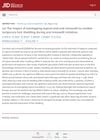 42 citations,
September 2018 in “Journal der Deutschen Dermatologischen Gesellschaft”
42 citations,
September 2018 in “Journal der Deutschen Dermatologischen Gesellschaft” Adult female acne requires a comprehensive treatment approach, including medical options and lifestyle changes, with attention to psychological well-being.
[object Object]  9 citations,
January 2014 in “Annals of Dermatology”
9 citations,
January 2014 in “Annals of Dermatology” Some breast cancer patients on hormonal therapy may develop male or female pattern hair loss, which can sometimes be improved with topical treatments.
 July 2018 in “Elsevier eBooks”
July 2018 in “Elsevier eBooks” Telogen Effluvium is a common, usually reversible hair loss condition, often improved by removing the trigger and possibly treated with various products, though their effectiveness is uncertain.
 July 2023 in “The Egyptian Journal of Hospital Medicine ”
July 2023 in “The Egyptian Journal of Hospital Medicine ” The conclusion is that emotional support and a variety of treatments are important for alopecia areata, but more research is needed.
7 citations,
January 2022 in “SAGE open medical case reports” Upadacitinib successfully treated a child's severe skin and hair loss issues.
 1 citations,
January 2023 in “Cutis”
1 citations,
January 2023 in “Cutis” You might not need to stop cancer treatment if you get a rare skin reaction from EGFR inhibitors, as skin treatments can help manage it.
5 citations,
January 1995 in “Journal of Dermatological Treatment” Calcipotriol does not improve the effectiveness of squaric acid dibutylester in treating alopecia areata.
January 2023 in “Journal of Clinical and Diagnostic Research” Microneedling with PRP is as effective and safe as minoxidil+finasteride for treating hair loss.
January 2023 in “International journal of research publications” Rice bran oil works as well as 2% minoxidil to prevent hair loss and promote hair growth.
February 2023 in “Journal of Cosmetic Dermatology” Combining microneedling with either vitamin D3 or bimatoprost improves hair regrowth more than microneedling alone.
 1 citations,
May 2019 in “Frontiers in Pharmacology”
1 citations,
May 2019 in “Frontiers in Pharmacology” The book provides detailed information on natural ingredients in beauty products and emphasizes the need for more human trials to confirm their effectiveness.
[object Object]  5 citations,
July 2018 in “The Egyptian Journal of Hospital Medicine”
5 citations,
July 2018 in “The Egyptian Journal of Hospital Medicine” The conclusion is that antibiotics are not the best acne treatment and early treatment is important to prevent scarring, especially for those with a family history of acne.
 January 2022 in “European Journal of Gynaecological Oncology”
January 2022 in “European Journal of Gynaecological Oncology” Topical imiquimod use for treating a cervical lesion might cause delayed hair loss.
 28 citations,
July 2002 in “Australasian Journal of Dermatology”
28 citations,
July 2002 in “Australasian Journal of Dermatology” Lupus can look like hair loss from alopecia areata but needs different treatment.
 July 2002 in “Australasian Journal of Dermatology”
July 2002 in “Australasian Journal of Dermatology” A woman with lupus had hair loss and skin issues that were successfully treated with medications.
 November 2024 in “Journal of Drugs in Dermatology”
November 2024 in “Journal of Drugs in Dermatology” Injectable minoxidil is a promising, effective treatment for hair loss.
 December 2024 in “Therapeutic Delivery”
December 2024 in “Therapeutic Delivery” Topical dutasteride shows promise for hair loss but needs more research.
November 2022 in “Journal of Education, Health and Sport” Combination therapy for hair loss can improve results and reduce side effects.
December 2022 in “Journal of The European Academy of Dermatology and Venereology” The 7.1% withdrawal rate was in the oral finasteride group, not the topical one.
November 2022 in “Journal of Investigative Dermatology” Combining PRP and minoxidil improves hair growth and density in treating hair loss.
December 2022 in “Clinical and experimental dermatology and therapies” Adding the topical gel improved hair growth more than using minoxidil or finasteride alone.
 2 citations,
January 2021 in “JAAD Case Reports”
2 citations,
January 2021 in “JAAD Case Reports” Using a special laser and skin medication together successfully cleared a skin condition in a pregnant woman.
 January 1991 in “Journal of Pediatric Health Care”
January 1991 in “Journal of Pediatric Health Care” Hair loss in children can be caused by fungal infections, trauma, autoimmune disorders, or stress, and treatments vary depending on the cause.
 January 2022 in “DOAJ (DOAJ: Directory of Open Access Journals)”
January 2022 in “DOAJ (DOAJ: Directory of Open Access Journals)” Argan oil-based nano carriers could potentially deliver caffeine to hair follicles to treat hair loss.
January 2019 in “Egyptian Journal of Dermatology and Venereology /Egyptian Journal of Dermatology and Venerology” Mixing calcipotriol with a steroid is almost as effective as using a steroid alone for alopecia areata and has fewer side effects.
January 2022 in “Clinical dermatology review” A girl with a rare skin condition called Keratosis Follicularis Spinulosa Decalvans showed no significant improvement with treatment.
36 citations,
January 2016 in “The journal of investigative dermatology/Journal of investigative dermatology” The document concludes that understanding genetic mutations in the PI3K-AKT-mTOR pathway can lead to better diagnosis and treatment for certain genetic skin disorders.
January 2022 in “Clinical Cases in Dermatology” Early treatment of traction alopecia can reverse hair loss; prevention involves avoiding tight hairstyles.
January 2022 in “Clinical Cases in Dermatology” Chemotherapy can cause significant but usually reversible hair loss, and managing it involves patient education and hair care strategies.
 July 2024 in “The journal of investigative dermatology/Journal of investigative dermatology”
July 2024 in “The journal of investigative dermatology/Journal of investigative dermatology” Using both topical and oral minoxidil does not reduce hair shedding.















